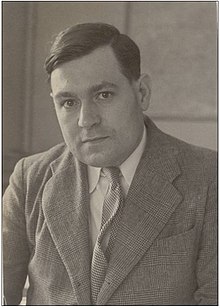|
Paul Coste-Floret
Paul Coste-Floret (9 April 1911 – 27 August 1979) was a French politician. He was born and died in Montpellier, France. CareerCoste-Floret was originally an academic, becoming Doctor of Law in 1935 and teaching law at the University of Algiers.[1][2][3][4] During the Second World War, Coste-Floret was active in the French Resistance.[5] He also advised André Philip and François de Menthon, ministers in the Free French provisional government.[4] After the war Coste-Floret was an assistant prosecutor at the Nuremberg trials.[4] He was elected as a député to the Assemblée Nationale in 1946 as a member of the Mouvement Républicain Populaire, for the department of Hérault, and served until 1958.[1][3][4][6] Coste-Floret supported the political return of General de Gaulle and was a member of the Constitutional Consultative Committee which prepared the Constitution of 1958.[1] He was re-elected député of the MRP in 1958, and served with the centrist group until 1967.[6] He was nominated by the president of the Senate, Alain Poher, to the Conseil constitutionnel from 23 February 1971, and served on this until his death.[4] Political viewsAs minister of the French Overseas Territories, Coste-Floret worked on the Halong Bay Agreements (Accords de la baie d’Along) in 1949. He modified the law of Cochinchina, which became part of Vietnam. He proposed increased family benefits. As a député he defended the wine producers of Midi. In principle he supported the statute of Algeria in 1957, but still said that he would vote against it.[7] He recommended greater autonomy for French Black Africa. From 1967 to 1971 he was vice-president of Centre Démocrate.[4] Other postsCoste-Floret was mayor of Lamalou-les-Bains from 1953 to 1959 and mayor of Lodève from 1959 to 1967.[4] He was president of the departmental council of Saint-Gervais-sur-Mare from 1967 to 1973.[4] He was chair of the University of Montpellier from 1977 to 1979.[4] Personal lifeHe was the twin brother of the politician Alfred Coste-Floret.[1] Government roles
References
|
||||||||||||||||||||||||||||||||||||||
